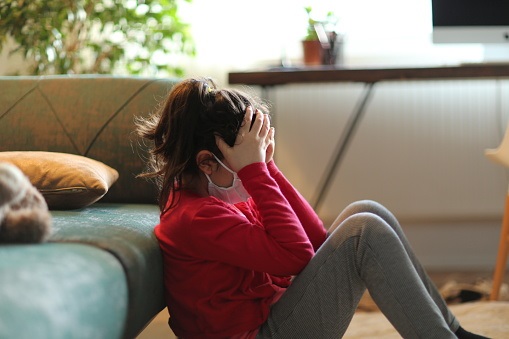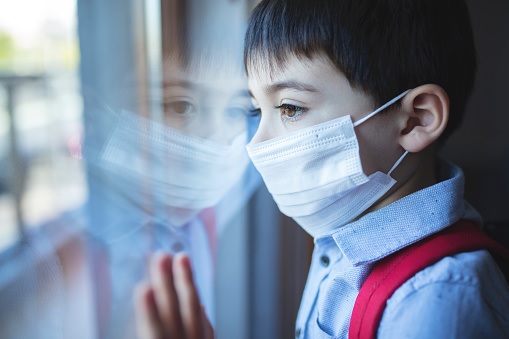Referrals for child mental health services have risen by 39% in England in just one year, official data has revealed.
 NHS referrals for mental health treatment for under-18s increased to more than 1.1 million during 2021-22, compared to 839,570 in 2020-21, and 850,741 in 2019-20.
NHS referrals for mental health treatment for under-18s increased to more than 1.1 million during 2021-22, compared to 839,570 in 2020-21, and 850,741 in 2019-20.
The figures – branded “alarming” by the NSPCC – represent children who are suicidal, self-harming or suffering serious depression or anxiety, as well as those living with eating disorders.
Social issues impacting child mental health
 Experts say key social issues, including the Covid-19 pandemic, social inequality, austerity and online harm are all fuelling soaring rates of mental ill-health among children and young people.
Experts say key social issues, including the Covid-19 pandemic, social inequality, austerity and online harm are all fuelling soaring rates of mental ill-health among children and young people.
They also said that children continue to face increased academic pressures to catch up following the Covid-19 lockdowns, while worrying about their future prospects amid a cost-of-living crisis and issues like climate change.
Mental health services unable to respond quickly enough
Dr Elaine Lockhart, Chair of the Child and Adolescent Psychiatry Faculty at the Royal College of Psychiatrists, warned that overstretched services mean that children are sliding through the cracks.
She explained that “specialist services are needing to respond to the most urgent and the most unwell,” such as children suffering from psychosis, suicidal thoughts and severe anxiety disorder. Meanwhile, targets for seeing children with eating disorders were sliding “completely.”
Data from NHS Digital shows that hospital admissions for children with eating disorders have risen by 82% in two years.
Lockhart added:
“I think what’s frustrating for us is if we could see them more quickly and intervene, then the difficulties might not become as severe as they do, because they’ve had to wait.”
A difficult year for mental health
 Lockhart explains that child mental health had been declining before the pandemic struck, with increasing social inequality, austerity and online harm all playing a role.
Lockhart explains that child mental health had been declining before the pandemic struck, with increasing social inequality, austerity and online harm all playing a role.
Then Covid-19 hit and lockdowns were introduced, resulting in “such a negative effect on a lot of children. Those who had been doing well became vulnerable and those who were vulnerable became unwell.”
Tom Madders from the youth mental health charity YoungMinds described the new figures as “deeply concerning.”
He said:
“The last year has been one of the most difficult for this age group, emerging from the pandemic to limited prospects for their futures, coupled with an increase in academic pressure to catch up on lost learning, and the impact of the cost-of-living crisis.
“The current state of play cannot continue. The government must get a grip of the situation.”
More funding for mental health services
Meanwhile, a spokesperson from the Department of Health and Social Care said they were investing £2.3 billion a year into mental health services so that an additional 345,000 children and young people will be able to access mental health support by 2024.
They added that they were “aiming to grow the mental health workforce by 27,000 more staff by this time too.”
Child mental health training and support
 First Response Training (FRT) is a leading national training provider delivering courses in subjects such as health and safety, first aid, fire safety, manual handling, food safety, mental health, health and social care, safeguarding and more.
First Response Training (FRT) is a leading national training provider delivering courses in subjects such as health and safety, first aid, fire safety, manual handling, food safety, mental health, health and social care, safeguarding and more.
They work with a large number of early years and childcare providers, as well as schools, colleges, and children’s services.
Their courses include Understanding Mental Health, Youth Mental Health First Aid, Anxiety Awareness, Self-Harm Awareness and Suicide Awareness.
A trainer from FRT says:
“Children have faced isolation, loneliness, academic upheaval, bereavement, money worries and other difficulties since the pandemic, and, on top of this, when they do come forward with concerns about their mental health they may have to wait a long time for the specialist support they need.
“It’s therefore vitally important that anyone who works closely with children and young people has an understanding of mental health, is able to spot the signs that someone may be struggling and can offer appropriate early help and support. Focused training can help with this.”
For more information on the training that FRT can provide, please call them today on freephone 0800 310 2300 or send an e-mail to info@firstresponsetraining.com.
